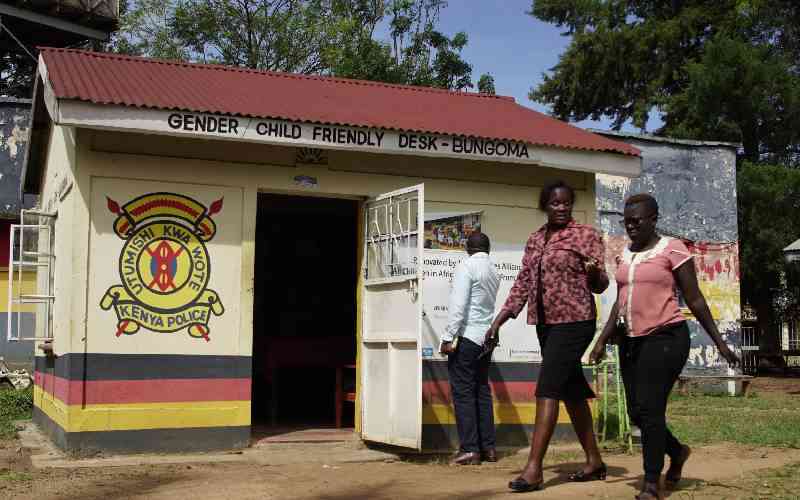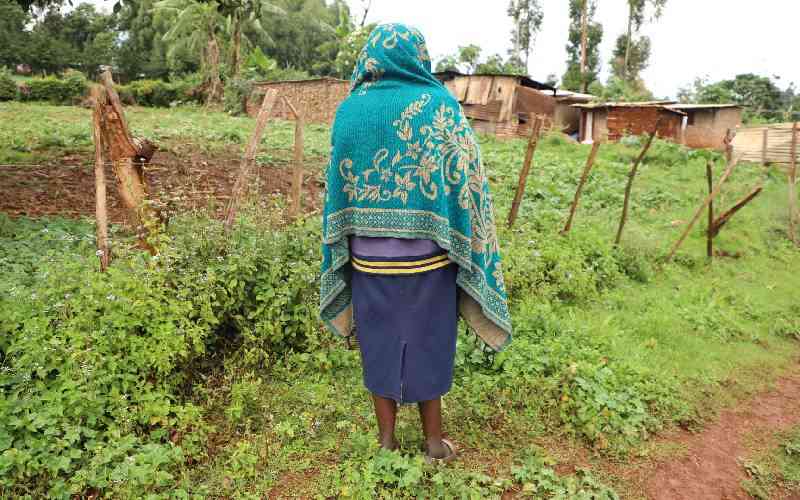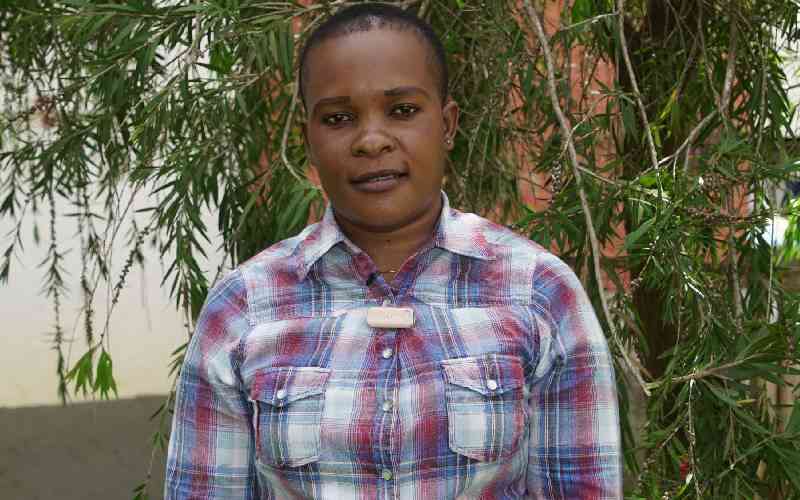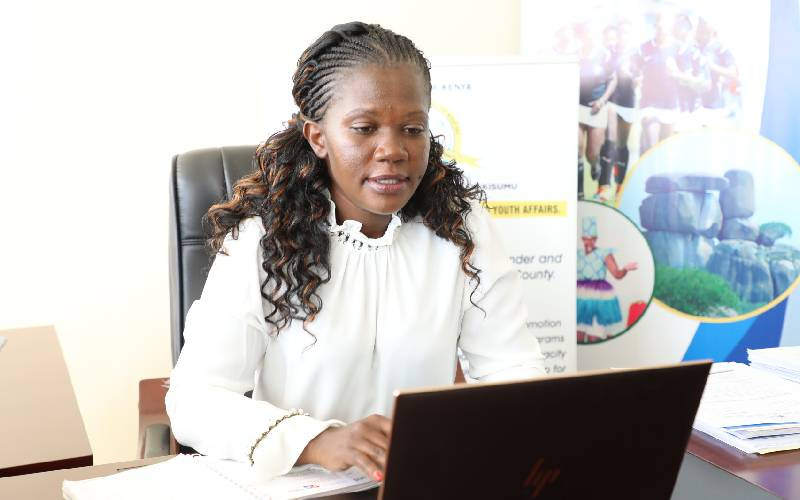
In the quiet hills of Chepkurkur village, Bungoma County, the golden sun rays cast a deceptive warmth on a community grappling with a dark reality, an alarming surge in sexual gender-based violence (SGBV). The victims, often silenced by societal norms and stigma, are left to bear the burden of their pain alone.
Women gathered in small groups at Kopsiro Shopping Centre are seen talking in low tones. In this part of the world, sexual gender-based violence is never debated in public.
Chebet, a pseudonym used to protect her identity, narrates the harrowing experience of her 15-year-old daughter, a victim of a brutal defilement ordeal. "It was on September 15 at 6 pm when my daughter was dragged by my neighbour of 33 years into his house and raped several times. Because she has a hearing impairment, she could not scream for help," Chebet recalls.
This heart-wrenching story is not isolated; it echoes throughout Bungoma County, where a shocking 62 per cent of women have reported physical violence, and 30 per cent have experienced sexual violence, as per the Kenya Demographic Health Survey of 2022.
In the next village, we meet Rose Chemos not her real name, who has suffered multiple tragedies. In the 2007 post-election violence, her husband was hacked to death by unknown assailants. Later, in the 2017 post-election violence, Chemos was raped by people known to her.
- Over 100 people die by suicide in three months in Nyeri County
- Kenya steps up health investments to safeguard mothers and children
- Kenya elevates care work as a public good, pledges bold action to empower caregivers
- Digital spaces fuel rise in online sexual abuse of women amid weak safeguards
Keep Reading
"I was dragged from my home and raped by two men from my village until I lost consciousness. I reported the case, and no action has been taken to date," Chemos said.
Bungoma Deputy Governor Jenepher Mbatiany said the county recorded 2,405 cases of gender-based violence among individuals aged 10-17 years in 2022, representing an increase compared to the 1,127 cases recorded in 2021.
"Between January and July 2023, the county has already reported 411 cases of sexual gender-based violence, of which 75 per cent involve girls between the ages of 10 to 17 years old," Mbatiany said.
The stark reality is reflected in the numbers, Bungoma County has an SGBV prevalence of 23 per cent, against the national prevalence of 13 per cent with Kimilili, Mt Elgon, and Bumula constituencies listed as hotspots for sexual gender-based violence.
The gravity of the situation extends beyond Bungoma. Vihiga County, just two hours away, grapples with its own crisis.

Cultural prohibitions against women testifying against family members contribute to unreported cases, fostering a rise in incest and teenage pregnancies.
In Vihiga, cases of incest are alarmingly high, with Vihiga Health Centre recording 94 gender-based violence cases between March and November of 2023 alone.
"The majority of the cases are incest, the highest ever in my sixteen years of practice. All involving family members. On average, the facility records 10 to 20 cases of SGBV per month, with 100 pregnancies every year in Central Maragoli Ward alone," Boaz Aliona, a clinical officer at the health center said.
In the quiet corners of Lusengeti Village, a heartbreaking tale of innocence lost unfolds at the Blessed Heaven Rescue Centre. Amid pain and vulnerability stands two-eight-month-old Violet, a symbol of resilience and the harsh realities faced by the most vulnerable members of this society.
Jael Abukhutsa, the founder of the rescue center, recounts the disturbing events that befell Violet. "Violet was raped and left for dead six months ago by a relative. I was called to rescue her when she was unconscious, took her to the hospital, and filed the case," Abukhutsa reveals, her voice laden with the weight of the tragedy.
Despite the apparent agony, Violet's innocence radiates, creating a stark contrast with the brutality she endured.
Tragically, justice for Violet remains an elusive dream, obscured by the shadows of family secrets. The perpetrator, shielded by familial ties, continues to evade accountability, leaving a young girl's plea for justice unanswered.
The disturbing narrative of Violet echoes a broader societal issue highlighted by the Kenya Demographic and Health Survey (KDHS) 2022 report.

According to the report, intimate partners constitute a staggering 63 per cent of reported sexual violence cases, while fathers and stepfathers account for 0.1 per cent.
Brothers and stepbrothers contribute 0.8 per cent and other relatives make up 5.9 per cent of the reported SGBV cases.
These statistics underscore the alarming prevalence of sexual violence within familial and close-knit relationships. Cases of incest are recorded high in sub-counties of Hamisi, Lwanda, and Emuhaya in Vihiga County.
Violet's story serves as a chilling reminder that behind these statistics are real lives, real pain, and a desperate need for a justice system that can deliver on its promise.
The United Nations Women report unveils a grim global picture, with one in three women worldwide experiencing physical or sexual violence with only 1 per cent ever seeking professional help.
In Kenya, the situation is exacerbated by poverty, retrogressive cultural norms, and inadequate funding for programs to address SGBV.
"I firmly believe that violence against women and girls is not just a crime; it is a blatant violation of their fundamental human rights. The immediate and long-term repercussions physically, sexually, and mentally can be nothing short of devastating, and in some heartbreaking cases, even fatal," asserts Betty Okero, Team Leader of the Civil Societies Organization Network in Kisumu County.
Amidst the troubling statistics, the serene setting of Kisumu County along the shores of Lake Victoria becomes a backdrop for personal stories that echo the harsh reality faced by survivors.
Atieno, not her real name, shares a poignant journey marked by a forced exit from school due to pregnancy, homelessness, and a subsequent diagnosis of HIV and AIDS.

"I had a sexual affair with a man while in Form Two, got pregnant, and had to drop out of school. Later, my aunt kicked me to the streets. Luckily, I was taken in by the Women Concerns Centre in Nyalenda," Atieno recalls.
A similar plight is experienced by Amina, an 11-year-old victim of rape in Kaloleni informal settlement.
Zara Ismile, a witness in Amina's court case, highlights the concerning trend of families covering up incidents of defilement through informal negotiations, perpetuating a cycle of injustice.
This crisis stands as a formidable obstacle to achieving Sustainable Development Goal '5,' which aspires to attain gender equality and empower all women and girls by eliminating all forms of violence against them.
The United Nations Convention on the Elimination of All Forms of Discrimination against Women and national laws provide a legal framework in combating the widespread SGBV cases, but societal change remains imperative. However, the challenges persist, with poverty and negative gender norms identified as root causes.
In response to this urgent situation, the "Let it Not Happen Again" project, initiated in 2019 by the Governments of Italy and Ireland in collaboration with UN Women and The Office of the United Nations High Commissioner for Human Rights (OHCHR), has been making strides in preventing and responding to SGBV, particularly violence against women.
UN Women in partnership with the Action Coalition on Gender-based Violence, are actively working to end violence against women and girls in Kisumu, Vihiga and Bungama counties. From legal reforms to comprehensive services for survivors, the goal is to foster a culture of equality and zero tolerance for violence.
'Without ambitious investments to scale up prevention programmes, implement effective policies, and provide support services to address violence against women and girls, countries will fail to end gender-based violence by 2030.
The Italian Agency for Development Cooperation is partnering with UN Women to advance and support the Government of Kenya's efforts to end gender-based violence.
"This year, we launched the fourth phase of the 'Let It Not Happen Again' project, bringing our total commitment towards this very successful initiative to Sh446 million, specifically targeting women's empowerment, improving health, and environmental sustainability in arid and semi-arid lands,' Giovanni Grandi, Head of the Italian Agency for Development Cooperation Regional Office in Nairobi, said.
The project's focus on community dialogues and capacity building within the justice system has seen progress in ending impunity for perpetrators.
The program has trained police officers and established gender desks to enhance coordination, setting up Court Users Committees, that bring together police, judicial officers, civil societies, and medical officers who play a pivotal role in fast-tracking justice for SGBV victims.
"The County's commitment to addressing SGBV has seen designated 12 magistrates specifically for SGBV cases and allocated dedicated days for each to handle these crucial matters," Kenneth Cheriyot, Senior Principal Magistrate, Kisumu Law Court, said.

Amina, Atieno Chebet, and Violet look up to the justice system for their case to be heard and determined.
"Through the Court Users Committee, we have been able to fast-track 50 cases to hearing and half to conclusion. Now, justice is seen as served as all parties are involved. The committee meets to review the pathway to justice," Fatuma Wambui, a member of the Court Users Committee at Winam Social Justice Centre in Kisumu, said.
Wambui said they discuss gaps in the system and the way forward which has limited blame games on who failed.
This she said has also ensured that justice is served to the victims within the timeframe.
Beatrice Odongo, County Executive Committee Member, Gender Department, Kisumu County, acknowledges challenges in access to justice, citing weak policy framework and lack of financing.
"Gender is underfunded in most of the counties, and this hinders us as stakeholders to implement programs geared towards mitigating the prevalence of GBV," she said.
The UN Women report indicates that poverty and lack of viable livelihoods still greatly drive gender-based violence.
This is worsened by the current economic climate, which has brought increased financial stress among families, further exposing women and girls to vulnerabilities.
The fight against SGBV in Kenya necessitates a comprehensive approach, including strengthening the justice system, raising community awareness, and providing economic empowerment for women.
Collaboration among the government, civil society, and international partners is crucial to eradicating the shadows cast by gender-based violence and achieving the goals of Sustainable Development Goal '5.'
 The Standard Group Plc is a multi-media organization with investments in media
platforms spanning newspaper print
operations, television, radio broadcasting, digital and online services. The
Standard Group is recognized as a
leading multi-media house in Kenya with a key influence in matters of national
and international interest.
The Standard Group Plc is a multi-media organization with investments in media
platforms spanning newspaper print
operations, television, radio broadcasting, digital and online services. The
Standard Group is recognized as a
leading multi-media house in Kenya with a key influence in matters of national
and international interest.











